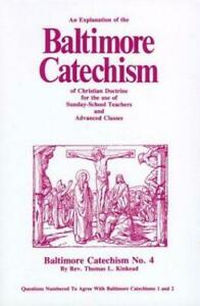Kinkead Explanation of Baltimore Catechism (Catholic) is a work explaining the Baltimore Catechism by Kinkead. These chapters are questions and answers with expanded explanations.
An Explanation of The Baltimore Catechism of Christian Doctrine
For The Use of Sunday-School Teachers and Advanced Classes
(Also known as Baltimore Catechism No. 4)
byRev. Thomas L. Kinkead
1891
This is a work explaining the Baltimore Catechism by Kinkead. These chapters are questions and answers with expanded explanations. Read online here.
Baxter Directions for a Peaceful Death is an article of 15 points on a Christian approaching his death and what he should be thinking about. This theme is good for the sick, but everybody should also meditate on these things. (Baxter is reformed).
CONTENTS of Kinkead Explanation of Baltimore Catechism (Catholic)
PRAYERS
The Lord’s Prayer
The Angelical Salutation
The Apostles’ Creed
The Confiteor
An Act of Faith
An Act of Hope
An Act of Love
An Act of Contrition
The Blessing before Meals
Grace after Meals
The Manner in Which a Lay Person Is to Baptize in Case of Necessity
CATECHISM
Lesson 1–On the End of Man
Lesson 2–On God and His Perfections
Lesson 3–On the Unity and Trinity of God
Lesson 4–On Creation
Lesson 5–On Our First Parents and the Fall
Lesson 6–On Sin and Its Kinds
Lesson 7–On the Incarnation and Redemption
Lesson 8–On Our Lord’s Passion, Death, Resurrection and Ascension
Lesson 9–On the Holy Ghost and His Descent upon the Apostles
Lesson 10–On the Effects of the Redemption
Lesson 11–On the Church
Lesson 12–On the Attributes and Marks of the Church
Lesson 13–On the Sacraments in General
Lesson 14–On Baptism
Lesson 15–On Confirmation
Lesson 16–On the Gifts and Fruits of the Holy Ghost
Lesson 17–On the Sacrament of Penance
Lesson 18–On Contrition
Lesson 19–On Confession
Lesson 20–On the Manner of Making a Good Confession
Lesson 21–On Indulgences
Lesson 22–On the Holy Eucharist
Lesson 23–On the Ends for which the Holy Eucharist Was Instituted
Lesson 24–On the Sacrifice of the Mass
Lesson 25–On Extreme Unction and Holy Orders
Lesson 26–On Matrimony
Lesson 27–On the Sacramentals
Lesson 28–On Prayer
Lesson 29–On the Commandments of God
Lesson 30–On the First Commandment
Lesson 31–The First Commandment–On the Honor and Invocation of the Saints
Lesson 32–From the Second to the Fourth Commandment
Lesson 33–From the Fourth to the Seventh Commandment
Lesson 34–From the Seventh to the Tenth Commandment
Lesson 35–On the First and Second Commandments of the Church
Lesson 36–On the Third, Fourth, Fifth and Sixth Commandments of the Church
Lesson 37–On the Last Judgment and Resurrection, Hell, Purgatory and Heaven
Kinkead, T. - Explanation of Baltimore Catechism (Catholic) (114 downloads )
More Works on Catechisms and Creeds
- Westminster Confession of Faith
- Kinkead Explanation of Baltimore Catechism (Catholic)
- Boyce A Brief Catechism Of Bible Doctrine
- Bouwman, C. – The Overflowing Riches of my God (Belgic Confession)
- Baptist Confession of Faith (1689)
- Athanasian Creed
- Anon – New England Primer
Read this tract by Pastor Cox about the divine use of sickness explains how God works with sickness to remind man of his limited time on earth, the consequences of sin, etc.
In this tract Pastor Cox explains how God positively uses sickness to help us turn our thoughts and attention to the eternal. We get so involved in our daily lives sometimes that we forget that our life is but a vapor on this earth, soon to no longer be. God uses sickness as a severe warning that our time is running out, and we need to live as though every moment has a forward view towards eternity. How we spend our life is important.
Sections:
1. Understanding that God is God
2. Sickness because of Sin
3. Warning about approaching Death
4. Warning about Human weakness
5. The Error of the Sick
6. God listens to those who ask in sincerity
Job 13:15 Though he slay me, yet will I trust in him: but I will maintain mine own ways before him.
There is an attitude within much of Christianity that sickness in any form is bad, and God does not have anything to do with it. For these Christans, they ask God to take the sickness away, and sometimes (as though it was their right to be health) that they demand God to remove their sickness. The reality of life is that they continue ill, and many have a crisis of faith over this. For them, God is impotent, or God does not love them. In other words, their confidence, faith, and love of God depends on God always sending them good things. But this is not how the Bible indicates life is. God uses calamity and sickness for His own purposes and we have to understand this (and accept it).Please support our tract ministry by donating on the tract website (see sidebar). Because of your donations we can offer these tracts online, and for free. Read the Tract CH34
Please donate on sidebar to help support this website.
